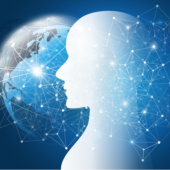Neuroscience of Feeling Christmassy
Santa, Holly, Glühwein, Turkey, and family cheer are easily associated with the season to be jolly. Does the brain perceive these as joy, happiness, and warmth when the bells start jingling? And what is the neuroscience behind these feelings?
Christmas is a complex feeling, right? For one it’s got a lot to do with finding oxytocin, in your stocking, and your heart.
The neural link to that Christmas feeling in the brain was researched in a study where two dozen people saw pictures of either a Christmas or non-Christmas motif during a functional magnetic resonance imaging (fMRI) machine that processed their neural data.
Feeling Christmassy
Pictures of you as a child with Santa, tasting mince pies, or pudding causes activation in brain regions like the amygdala related to the previous feeling of Christmases past – but sadly no specific area was identified. That is until the Japanese found happiness linked to Christmas in the brain.
A Japanese Christmas
Researchers in Japan have found a link between happiness and an area of the brain called the precuneus. They scanned 50 brains and investigated the happiness emotion using a happiness rating questionnaire. They suggest that feelings of happiness are associated with a larger right precuneus. Other positive emotions like joy, excitement, and feeling Christmassy and even more purpose in life are related within this region. But, of course, we don't know whether the findings in this small sample of Japanese people could be generalised to everyone’s happy feelings over Christmas. We also can’t easily apply cause and effect on whether or not the precuneus was triggered.
Inside Out
Maybe it’s best to watch the Disney channel over Christmas? The Disney film ‘Inside Out’ suggests specific regions of the brain are linked to specific emotions: joy, fear, anger, disgust, and sadness. This is not neurologically accurate but may help families keep the peace and maintain that Christmas cheer is akin to having an emotional language that helps resolve unnecessary conflict.
What is an emotion and, or, a feeling?
Are emotions pre-programmed reactions, hardwired into our brains? Is there a happiness circuit? According to researchers like Paul Ekman, the brain has core emotions, like fear, sadness, surprise, and happiness. But when it comes to Christmas cheer, there is no specific neural path found in the fMRI data. And no specific neural activation is associated with Christmas cheer and there being a more nuanced understanding. A “Christmas emotion” is better understood as a “Christmas feeling.”Feelings on Call
As I wrote in a previous post, we need to differentiate a feeling from an emotion. Feelings are the conscious awareness of the brain tallying the best response to an experience. The brain syndicates data about your physiological state, the environment, and other experiences and you then form a subjective psychological or conscious feeling. At Christmas, you feel joy because you associate good things with the holiday. This is because your brain recognizes the previous joy of family time and the excitement of gifting as per the feelings you had as a child.
Labeling Christmas Cards
We learn to label how we feel and this is why we use the same words to describe similar events of Christmases past. This is because of the belief that we think it is appropriate to have that Christmas feel at year-end. But no specific neural event is associated with any specific Christmas experience. It’s more of a global event until we learn more about the brain. This is as good an explanation we can currently offer from neural research. When it comes to emotions, neural activity isn’t always the same label, because each event is formed from, and associated with, different feelings.
Oh Christmas Tree, Oh Christmas Tree
Maybe a Christmas tree has associations with certain songs for you? Maybe it is other events your brain uses to label that “Christmas cheer” experience. That is why your family’s festive traditions don’t always seem to make sense to your friends or a new partner. Every time we notice feelings of Christmas, our brains create an emotion and we then have that Christmas feeling.
Being The Grinch
Maybe your family causes your stress? Getting through the holidays without a family feud is often tricky. Just as Christmas cheer can be seen as a feeling so too can the dread of family holiday politics. If you’ve had mainly negative experiences over Christmas, you may feel more “Grinchy” not Christmassy.
A Stuck Record
Regardless of whether you tend to feel happy or stressed you have the resources to improve that Christmas feeling. Your brain is simply playing the old recording of your feelings and experiences from previous Christmas holidays. The more positive experiences your brain has over Christmas, the more elegantly you will find that Christmas cheer in the future.
Hugs Not Bugs
If you want to get into the Christmas spirit, find those festive activities that you really enjoy. Share your time with the people you love, and remind yourself of rituals that make you feel happy connections. If neuroscience can give you anything this year, let it give you the gift of oxytocin, the ‘hug hormone’ that we all feel when we feel a loving connection.
Happy Christmas!





